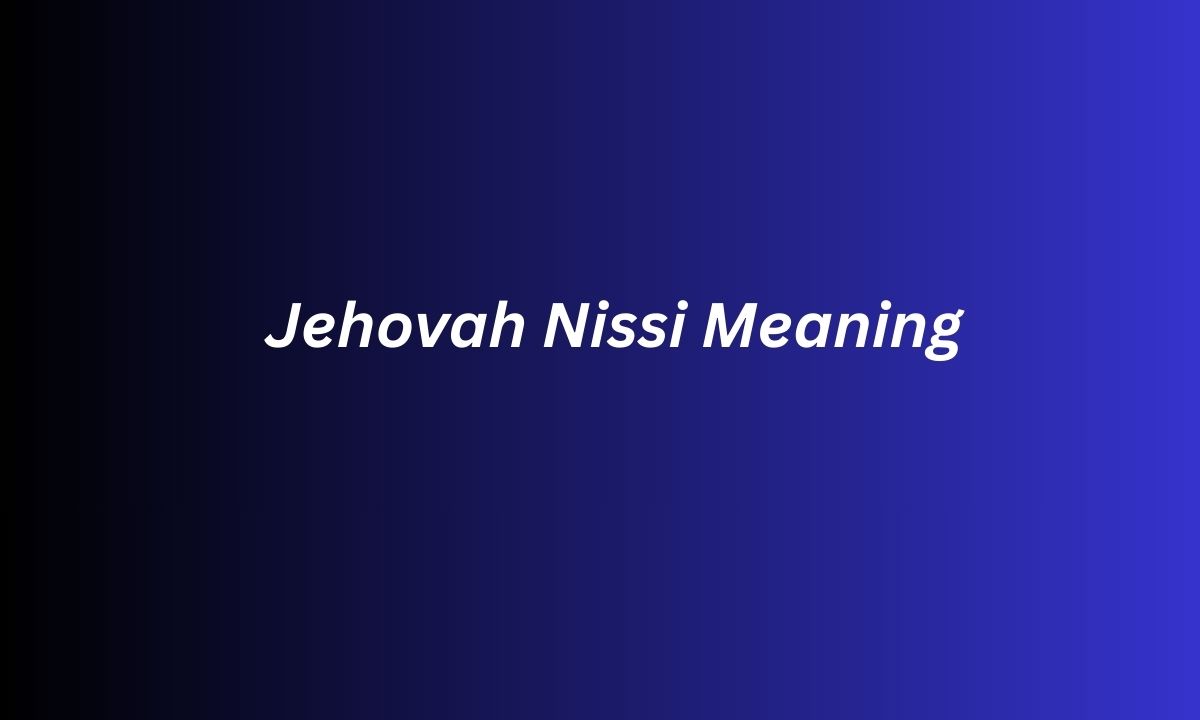The phrase Jehovah Nissi carries deep biblical and spiritual significance. It originates from the Hebrew Scriptures and has been embraced by believers as a symbol of God’s power, protection, and divine presence in moments of struggle or triumph.
Understanding the Jehovah Nissi meaning goes beyond mere translation; it reflects a covenant relationship between God and His people. It represents both faith and identity, offering comfort and encouragement during times of uncertainty, doubt, or conflict.
In this article, we will explore the Jehovah Nissi meaning, its historical and biblical background, its relevance in modern times, and how to use or express it in various professional, polite, or casual contexts, along with thoughtful alternatives.
Jehovah Nissi Meaning in Text
The phrase Jehovah Nissi comes from the Hebrew Bible, particularly the Book of Exodus (Exodus 17:15). It is translated as “The Lord is My Banner.” In biblical culture, banners symbolized identity, protection, and victory. By declaring God as a banner, the faithful acknowledged Him as their ultimate source of strength and triumph.
Moses first used this phrase after the Israelites defeated the Amalekites. By building an altar and naming it Jehovah Nissi, he affirmed that God was the one who led them to victory. This emphasizes not only divine intervention but also reliance on God’s presence in every battle of life.
In contemporary usage, the Jehovah Nissi meaning extends beyond its biblical roots. It inspires spiritual songs, prayers, and personal affirmations of faith. It serves as a reminder that people can turn to God as a protector, guide, and constant source of courage.
Exploring the Hiatus Meaning of “Jehovah Nissi Meaning”
The word hiatus generally refers to a pause, gap, or break. When we apply the idea of a “hiatus meaning” to the phrase Jehovah Nissi meaning, it signifies moments in life when people experience pauses, struggles, or interruptions. In these times, they find renewed strength by remembering that God is their banner.
A “hiatus” in spiritual terms can symbolize temporary challenges or breaks in personal progress. However, recalling the Jehovah Nissi meaning allows one to see that even in the pause, divine guidance remains constant. Just as the Israelites faced interruptions in their journey, believers today can endure pauses with faith.
Thus, exploring the hiatus meaning of Jehovah Nissi meaning connects ancient biblical truth with modern human experiences. It shows that while life may pause or shift, divine presence remains unshaken and dependable.
Alternatives to Expressing “Hiatus Meaning”
When writing or speaking in different contexts, it is often necessary to replace the word hiatus with more suitable or natural expressions. Depending on whether the setting is formal, polite, or casual, there are many effective alternatives.
Below are 15 examples of alternatives to the word hiatus explained with tone and usage:
- Break – A simple, casual alternative for everyday conversations.
- Pause – Polite and professional, often used in formal communication.
- Interruption – Neutral and professional, suitable for workplace settings.
- Gap – Simple and clear, usable in both casual and formal contexts.
- Interval – More formal, often applied in academic or structured language.
- Rest – Casual and personal, often used in everyday well-being contexts.
- Suspension – Formal, typically applied in administrative or legal writing.
- Recess – Professional or academic; often used in legal or educational contexts.
- Time off – Casual and conversational, commonly used in workplace or personal discussions.
- Standstill – Neutral and descriptive, useful for professional analysis.
- Downtime – Semi-casual, especially relevant in technology or business contexts.
- Delay – Professional and precise, suitable for formal documents.
- Hold – Neutral and versatile, often used in meetings or work reports.
- Lull – Polite and slightly literary, suitable for thoughtful or reflective tones.
- Sabbatical – Professional and polite, used in academic or career contexts.
Each of these alternatives provides nuance. For instance, “pause” may work in a meeting, while “time off” feels more natural in casual discussion. Selecting the right term depends on the formality of the situation and the impression one wishes to create.
The Relevance of Jehovah Nissi Today
The Jehovah Nissi meaning continues to hold strong relevance in today’s world. In a time when many face uncertainties, challenges, or “hiatuses” in their personal and professional lives, the concept of God as a banner symbolizes hope, unity, and resilience.
Churches, spiritual writers, and individuals often use this phrase to encourage others during difficult moments. Whether in sermons, songs, or motivational writings, Jehovah Nissi reminds people to look beyond temporary struggles and trust in a greater source of guidance.
It also acts as a unifying declaration of faith. Just as banners in history rallied people to a cause, the phrase Jehovah Nissi continues to inspire collective strength, reminding communities that faith can overcome divisions, pauses, and setbacks.
Conclusion
The phrase Jehovah Nissi meaning is rooted in ancient scripture but remains deeply relevant today. It symbolizes God’s protection, presence, and leadership in life’s journeys, especially during moments of pause or struggle.
Exploring the hiatus meaning within this context shows how biblical truths resonate in modern life. Pauses, delays, and interruptions are natural, but they can be endured with faith and strengthened by choosing encouraging alternatives in daily communication.
Ultimately, understanding the Jehovah Nissi meaning allows individuals not only to embrace spiritual heritage but also to apply timeless wisdom to contemporary challenges, expressing resilience in both words and actions.

Elizabeth crafts heartfelt messages for every occasion—anniversary wishes, love notes, prayers, thank-yous, and inspirational greetings—bringing warmth, joy, and connection to your special moments.










